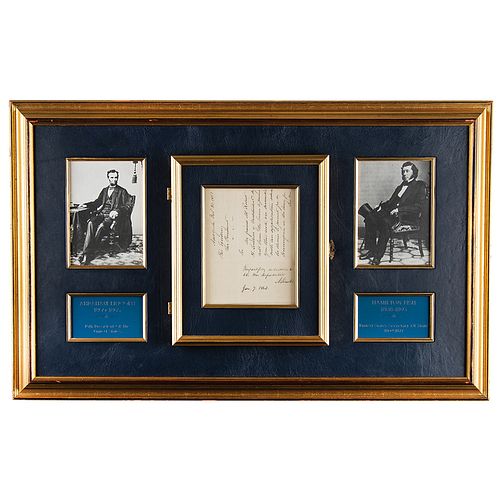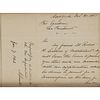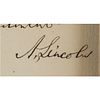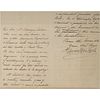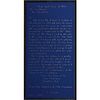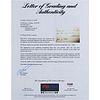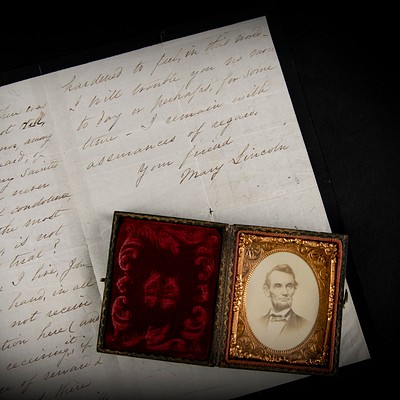Abraham Lincoln Autograph Endorsement Signed as President
Two ways to bid:
- Leave a max absentee bid and the platform will bid on your behalf up to your maximum bid during the live auction.
- Bid live during the auction and your bids will be submitted real-time to the auctioneer.
Bid Increments
| Price | Bid Increment |
|---|---|
| $0 | $5 |
| $50 | $10 |
| $200 | $25 |
| $500 | $50 |
About Auction
Feb 8, 2023
RR Auction support@rrauction.com
- Lot Description
Civil War-dated autograph endorsement signed as president, "Respectfully submitted to the War Department, A. Lincoln, Jan. 7, 1862," penned in the margin of an autograph letter sent to him by New York politician Hamilton Fish, one page both sides, 5.75 x 7.5, December 31, 1861. Fish writes, in full: "My friend Mr. Robert A. Ludlow of Westchester Co., N.Y. will have the honor to present you this note, in connection with an application which he desires to present for a commission in the Army for his son Mr. Banyen Ludlow, who was in the service in one of the New York Regiments & behaved with much gallantry at the battle of Bull Run. He has been educated as an Engineer & is a young man of intelligence & of energy—& well suited for the service in which he seeks to be employed. Mr. Ludlow, the father, is a worthy member of one of the oldest & most respectable & influential families of the State—he is thoroughly loyal & earnest & practical in his support of the Government in the maintenance of the Union & the Constitution." Handsomely matted and framed with glass on both sides, and hinged against a display with portraits of Lincoln and Fish, as well as engraved biographical plaques and a transcript of the letter to an overall size of 31.5 x 19.5. In fine condition. Accompanied by a full letter of authenticity and grading from PSA/DNA, evaluating both autographs as "MINT 9."
Lincoln's correspondent, Hamilton Fish, was one of New York's most influential politicians: having served a term in the U.S. House of Representatives (1843-45), as governor (1849-50), and in the U.S. Senate (1851-57), his voice was one of the most highly respected of all Republicans in the North. During the Civil War, Fish was chairman for the 'Union Defense Committee of the State of New York,' which worked to raise and equip Union Army troops from the state. In 1862, President Lincoln appointed him as a commissioner to visit Union prisoners held in Richmond, Virginia. In that capacity, Fish helped to establish the prisoner exchange program which continued virtually unchanged throughout the war. He would go on to serve as Secretary of State under Ulysses S. Grant, and is recognized as a 'pillar' of Grant's successful presidency.
In this important, war-dated letter, Fish recommends a soldier who distinguished himself at the First Battle of Bull Run—the first major battle of the Civil War, fought on July 21, 1861. The fierce fighting and heavy casualties underscored the ideological nature of the conflict, and made both sides realize that the war would be much longer and bloodier than previously anticipated. President Lincoln, surely taking into account Ludlow's battlefield experience and loyal pedigree, respectfully forwards Fish's request to his well-organized War Department, led by Edwin Stanton. A significant Civil War document, imbued with the politics and national pride of the era. - Shipping Info
-
Bidder is liable for shipping and handling and providing accurate information as to shipping or delivery locations and arranging for such. RR Auction is unable to combine purchases from other auctions or affiliates into one package for shipping purposes. Lots won will be shipped in a commercially reasonable time after payment in good funds for the merchandise and the shipping fees are received or credit extended, except when third-party shipment occurs. Bidder agrees that service and handling charges related to shipping items which are not pre-paid may be charged to a credit card on file with RR Auction. Successful international Bidders shall provide written shipping instructions, including specified Customs declarations, to RR Auction for any lots to be delivered outside of the United States. NOTE: Declaration value shall be the item’(s) hammer price and RR Auction shall use the correct harmonized code for the lot. Domestic Bidders on lots designated for third-party shipment must designate the common carrier, accept risk of loss, and prepay shipping costs.
-
- Buyer's Premium



 EUR
EUR CAD
CAD AUD
AUD GBP
GBP MXN
MXN HKD
HKD CNY
CNY MYR
MYR SEK
SEK SGD
SGD CHF
CHF THB
THB